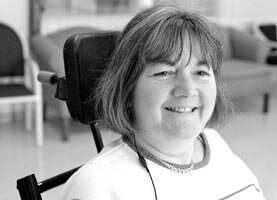At peace: Gentry succumbs to ALS
Just three months after raising the issue of experimental treatments for a desperate illness, Mary Jane Gentry has died of ALS, the devastating degenerative affliction commonly known as Lou Gehrig's Disease.
"She was so strong and brave," says Cathy Easter, a regional director of the Richmond-based ALS Association.
Gentry, who died in local nursing home on Thursday, May 26, came forward in a February 24 Hook cover story ["She's dying: His drug could save her"] that chronicled her plea for the UVA Medical Center to resume a promising drug study. Her untimely death, at just 47, serves as a piercing reminder that there is still no treatment and no cure for ALS.
Gentry, who was diagnosed in August 2003, was given less than three years to live and was soon confined to a wheelchair. But in the spring of 2004 she got some good news. Dr. James Bennett, a UVA neurologist, planned to conduct a study on a compound he believed might slow the nerve damage endemic to ALS.
"It was a ray of hope," Gentry explained in February.
Gentry and 15 other ALS patients signed up for the study, and after just eight weeks on the drug, pramipexole, many noticed remarkable changes. Gentry regained some function in her left hand, another patient could suddenly stand unassisted, and still another spoke for the first time in months.
"It was the first time we've seen something truly hopeful," says Easter.
At the conclusion of his approved eight-week trial, Bennett asked the Human Investigations Committee, the ethical group at UVA that oversees all human clinical trials, for an extension. In a move that stunned Bennett and his study subjects, the committee rejected his request, citing safety concerns.
"In a way, you're kind of beyond risk," explained 53-year-old Norfolk resident Bob Echols, who was diagnosed with ALS in 2003. "If you have ALS, you're going to die, period."
But Dr. Karen Schwenzer, chair of the Committee, said terminal illness was not a good reason to lower study standards. She and fellow committee members believed Bennett hadn't conducted enough animal studies. Because patients with a terminal illness are often "willing to try anything," she said, "they're vulnerable."
Bennett spent several months rewriting his "protocol," with the hope of getting Gentry and other patients back on the drug before it was too late. In March, he announced a $200,000 goal. By early April, thanks to assistance from Gentry and others, he had raised $160,000 and was advertising for a coordinator position. He had quantities of the drug synthesized in a North Carolina laboratory, and hoped to have it available by late April.
Precisely what happened since then is unclear, as Bennett referred the Hook to UVA spokesperson Peter Jump, who says Bennett's revised protocol will be reviewed by the committee this week.
"While we hope it will get approval," Jump explained, "we can't predict the Committee's action."
It's possible the Committee, says Jump, will approve the protocol but determine that none of the original study participants will be eligible. Conceivably, Jump says, Bennett could consider submitting a different protocol for those original participants to the HIC for review.
No matter what the Committee decides, Gentry won't be able to benefit from the drug. But Easter says Gentry, a former nurse, took comfort in the fact that she may have helped those who will come after her.
"Through her efforts, Dr. Bennett is in awesome shape," says an emotional Easter, "and she's at peace."

"If we can learn from the drug," says Gentry, "then at least my life has some impact in its last few years." Two years ago, Mary Jane Gentry was an avid swimmer and boater. Her final days required round-the-clock care.

"This has been the most inspirational thing I've ever done," says Dr. James Bennett of his ALS drug study.
FILE PHOTOS BY JEN FARIELLO
#